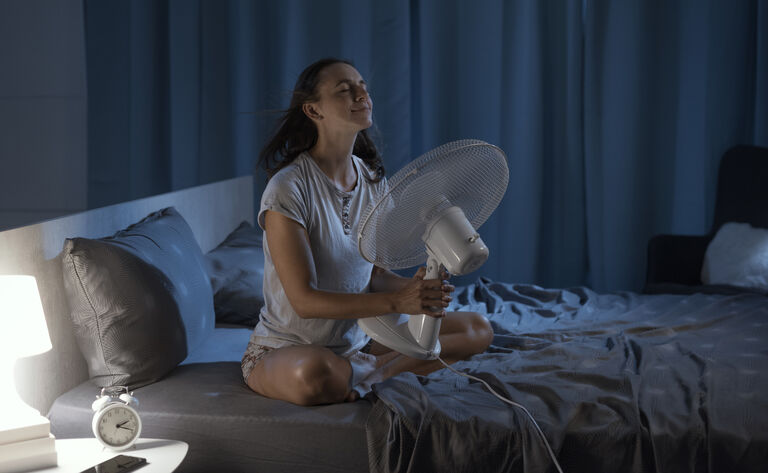Too Hot to sleep - Tips for sleeping in the heat

Now that Summer is here the days are getting longer with warmer nights. Sleeping comfortably becomes quite the challenge. But fret not; In this article, TEMPUR® is here to advise on sleeping during those sizzling summer months. Say goodbye to restless nights and hello to dreamy slumbers in the heat.
The connection between body temperature and quality sleep
Your body temperature usually hovers around 37°C, but it can change depending on factors like:
- Age
- Physical activity
- Time of day
This is all thanks to your circadian rhythm. The circadian rhythm is the body's internal biological clock that regulates various physiological processes and behaviours over a 24-hour cycle, influenced primarily by the light-dark cycle of the environment.
Throughout a day, your body temperature can vary by up to 1°C, and it's all perfectly regulated through a process called thermoregulation. Thermoregulation is the body's ability to maintain a stable internal temperature through processes such as sweating, shivering, and blood vessel constriction or dilation in response to external temperature changes.
When you wake up, your temperature starts off low and gradually rises as the day goes on. However, as evening approaches, it begins to drop again, giving your body a gentle nudge to get ready for sleep.
But what is the cause of this?
How does melatonin affect your body's temperature?
Melatonin, which is also known as the sleep hormone, is like the conductor of your body's internal clock. It gets to work between 9:00 pm and 8:00 am, to support with a smooth sleep experience for you.
This hormone is able to lower your body temperature, relax your muscles, and make you feel pleasantly sleepy. As the evening rolls in, your body temperature drops, signalling that it's time to wind down and prepare for a good night's rest.
While you snooze away, your body temperature continues to decrease, reaching its lowest point during those late hours between 2:00 am and 4:00 am. Come morning, around 8:00 am, melatonin production takes a break, allowing your core temperature to gradually rise, gently waking you up a few hours later.
The ideal bedroom temperature for restful nights
For a night of deep and restful sleep, it's best to keep your bedroom temperature between 15°C and 20°C. If it gets too hot to sleep, it can mess with the quality of your sleep. Everyone has their own preferences when it comes to the perfect sleep environment,. but slightly cooler temperatures generally work better for a great night's sleep. So, how to keep rooms cool in the summer?
Beat the heat: simple tips for how to cool down in bed
- Open windows for airflow, but close curtains to block the sun during the day
- If available, open the attic hatch to let out rising hot air
- Opt for lighter duvets or cotton sheets and wear sweat-absorbing cotton nightwear
- Stay hydrated with cold water and keep a glass by your bedside
- Cool down your body by placing an icy cold water-filled hot water bottle or chilled socks near your feet
- Use an electric fan to create a breeze; add a tray of ice and water for extra cooling
- Ensure a spacious bed for undisturbed sleep if sharing
Now that you're equipped with knowledge and practical tips, it's time to embrace the summer evenings.. By understanding the intricate relationship between body temperature and sleep, optimising your bedroom temperature, and implementing simple cooling techniques, you can transform your sleep haven into a sanctuary of relaxation, even during the hottest summer nights.
How do you plan on staying cool this summer?
Feel it for yourself
Find a TEMPUR store or Stockist and try out our range of mattresses for yourself

SIGN UP FOR THE NEWSLETTERS!
By signing up, you agree to receive TEMPUR Australia’s products, services, news, reviews and promotions by emails. For more information on how we process your personal data, please refer to our Privacy Policy.



